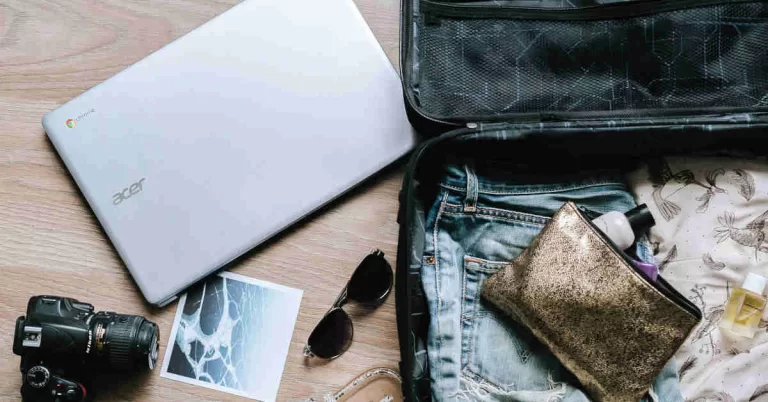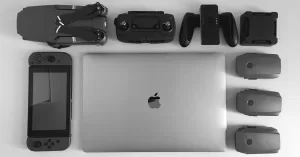Traveling with a laptop has become commonplace, whether it’s for work or personal use. With more airlines charging for carry-on baggage combined with the convenience of checking bags, you may have wondered whether it’s safe to pack your laptop in your checked baggage.
The short answer is yes, you can put a laptop in checked baggage. But a follow-up question would be whether you should pack it in your checked bag.
In this post, we’ll explore these questions as well as examining the ins and outs of traveling with a laptop in your checked baggage:
- The rules and regulations you need to be aware of.
- The potential risks and benefits.
- Tips to ensure your laptop arrives safely.
- Alternatives to packing your laptop in your checked luggage.
Regulations for Packing Laptops in Checked Baggage
FAA Regulations on Laptops
The FAA allows laptops to be packed in carry-on or checked baggage. However, the agency strongly recommends that you bring it with you in your carry-on.
If you do decide to pack it in your checked bag, the FAA advises that the device should be powered off, and steps taken to ensure that the laptop can’t be inadvertently powered on.
There are a few ways that you can achieve this:
- If your laptop has a removeable battery, you could remove it. You should then pack the battery in your carry-on bag.
- You could protect or cover the laptop’s power-on button to prevent it being accidentally activated.
- If your laptop battery is not removeable, you could drain it by leaving it on. Of course, this assumes that you won’t need to use it soon after you arrive and don’t have a power source.
TSA Regulations on Laptops
As the frontline of transport security, one of the Transportation Security Administration’s (TSA) roles is to implement the regulations set by the FAA. Accordingly, the agency allows laptops in both carry-on and checked baggage.
Why Are There Regulations on Laptops in Checked Baggage?
The primary reason behind these regulations is safety. Laptops and other electronic devices have lithium-ion batteries, which are known to be a fire hazard, especially when damaged or exposed to extreme temperatures. When placed in checked baggage, these batteries are at risk of being damaged or exposed to heat, which can potentially cause a fire. If a fire were to start in the cargo hold of a plane, it could go undetected and lead to catastrophic consequences.
Airline Policies for Checking Laptops
It’s worth noting that some airlines may have their own policies regarding the carriage of laptops in checked baggage. Although they must adhere to the FAA’s rules for laptops, airlines are free to place further restrictions. Therefore, it’s a good idea to check with your airline before you travel to ensure that you follow their rules.
Some airlines allow passengers to check their laptops as long as they are properly packed and secured, while others prohibit laptops in checked baggage altogether.
However, if an airline does allow laptops in checked baggage, it is accepted without liability. Airlines categorize laptops as fragile items, so they won’t be responsible for any damage or loss. Airlines reiterate the advice given by the FAA: they strongly advise that you avoid packing your laptop in checked luggage. Instead, you should bring it on board with you in your carry-on bag.
We reviewed the laptop policies of the 11 largest U.S. airlines. The results are summarized in the following table:
| Airline | Carry On | Checked |
|---|---|---|
| Alaska Airlines | Allowed | Allowed |
| Allegiant Air | Allowed | Not Allowed |
| American Airlines | Allowed | Allowed |
| Delta Air Lines | Allowed | Allowed |
| Frontier Airlines | Allowed | Allowed |
| Hawaiian Airlines | Allowed | Allowed |
| JetBlue | Allowed | Allowed |
| Southwest Airlines | Allowed | Allowed |
| Spirit Airlines | Allowed | Allowed |
| Sun Country Airlines | Allowed | Allowed |
| United Airlines | Allowed | Allowed |
As you can see from the above table, there is almost unanimous consensus across the airlines reviewed. Allegiant Air is the lone airline which does not allow laptops in checked baggage.
Why Put a Laptop in Checked Luggage?
There are a few reasons why you might consider putting your laptop in checked baggage:
- If you’re traveling with a lot of carry-on luggage, you may not have enough space to accommodate your laptop.
- If you’re concerned about theft, damage, or loss of your laptop, you may feel more secure by putting it in your checked luggage. For example, your itinerary may have multiple connections and you don’t want to have to worry about keeping an eye on your laptop during layovers.
- If you have a large or bulky laptop, you may prefer to pack it in checked luggage to avoid carrying it around during your trip. This becomes more of a convenience if your trip includes multiple flights.
Risks of Checking a Laptop
While it may be convenient to put your laptop in checked baggage, there are potential risks involved.
Here are some tips to minimize those risks:
Choose the Right Suitcase
The first step in packing your laptop in checked luggage is choosing the right bag. You should opt for a sturdy, hard-sided suitcase (duffel bags need not apply) that can better protect your device from bumps, drops, and other damage that may occur during transport.
Avoid using a soft-sided bag, as it offers little protection for your laptop.
Backup Your Data
Before traveling, make sure to back up all the data on your laptop. This will ensure that you don’t lose any important information if your laptop is lost or damaged.
Remove Laptop Accessories
Remove any accessories, such as chargers, mice, or headphones, from your laptop and pack them separately, preferably in your carry-on bag. This will prevent them from damaging the laptop or becoming lost.
Securely Pack Your Laptop
To minimize the risk of damage, pack your laptop in a padded case. Make sure to use a case that is specifically designed for laptops and provides adequate protection.
Once your laptop is in the bag, place it in the center of your checked baggage. Surround your laptop with soft clothing to provide extra cushioning. Make sure your bag is packed tightly, so your laptop doesn’t shift around during transport. If your suitcase has compression straps be sure to use them to keep your belongings in place.
Label Your Bag with a Fragile Sticker
Mark your bag as fragile or label it with a “handle with care” sticker. This may prompt baggage handlers to be more careful when handling your bag. I stress the word “may”, as I’m not entirely convinced that a fragile sticker has much influence on how luggage is handled.
Use TSA-Approved Locks
Use TSA-approved locks on your luggage as a theft deterrent. TSA-approved locks allow TSA agents to open your luggage, if necessary, without damaging the lock.
Alternatives to Putting a Laptop in Checked Baggage
Carrying the Laptop as a Carry On
One of the most obvious alternatives to putting a laptop in checked baggage is to pack it with you in your carry-on luggage. This option allows you to always keep your laptop with you, reducing the risk of damage or theft. Additionally, you can easily monitor your laptop during security checks and while boarding the plane, ensuring its safety throughout the journey.
If you are traveling with companions, see if one of them has space available in their carry-on baggage to carry your laptop on your behalf. Alternatively, they can carry some of your other carry-on items, allowing you to keep your laptop with you.
When I travel, bringing my laptop is the biggest issue when it comes to luggage. To be more accurate, I should state “laptops”. I usually travel with two laptops: a 17-inch behemoth which is my production machine, and a more modest 14-inch device for when I’m on the move. Let’s not forget that I also have a camera, a couple of phones, a tablet, Kindle….
Much of my travel is through Europe and Asia, so I’m also subject to smaller carry-on baggage allowances: often as little as 15 pounds (7 kg)!
I have yet to pack a laptop in checked baggage – so, what did I do?
If I’m traveling with company, I see if they can accommodate some of my carry-on. If traveling alone, I make concessions by:
- Not packing an emergency days’ worth of clothing in my carry-on bag.
- Storing power cables, cords, and accessories in my checked bag or in a carry-on jacket’s pockets.
Using Shipping Services
If you are traveling for an extended period or do not want to carry your laptop with you, you can consider shipping it to your destination. Hands Off My Suitcase recommends Luggage Forward for shipping any type of luggage worldwide.
Consider Buying Insurance
If you’re traveling with a particularly valuable laptop, you may want to consider buying travel insurance. This will protect your laptop and other valuables in case they are lost, stolen, or damaged during the flight.
Be sure to read the terms and conditions of the insurance policy carefully before buying to ensure that your laptop is covered.
Renting Laptops at Your Destination
If you’re traveling for work and need a laptop, you can rent one at your destination. Many airports and hotels offer laptop rental services, and you can also find rental companies online. Renting a laptop can be expensive, but it’s a good option if you need a laptop for a short period of time.
Many hotels have business centers and computers available in the lobby for guests to use. Call ahead to see if these services will meet your needs.
Use Another Device as a Laptop Alternative
Reevaluate whether you can use your phone or a tablet as a short-term substitute for a laptop. Cell phones and tablets are very capable devices. You may be able to leave your laptop at home and use one of these devices instead.
Final Thoughts
While it is technically possible to put a laptop in checked baggage, it is not recommended due to the potential risks involved. Damage, theft, and loss are all valid concerns that should be considered before checking your laptop. If you do decide to pack your laptop in checked baggage, make sure to follow the tips outlined above to minimize the potential risks.



